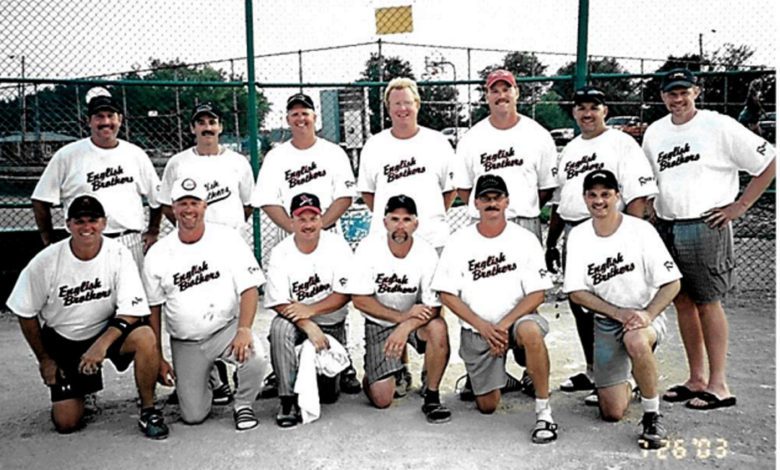English Brothers Softball to be inducted into Illinois ASA Hall of Fame

By FRED KRONER
Fifty years ago, the decade of the 1970s was ushered in after the conclusion of a tumultuous 1960s.
Nationally, there was a President (Richard Nixon) already in office who would resign before the decade of the ‘70s was half over as corruption in Washington D.C. became a prominent focus thanks to the Watergate Investigation.
In Illinois, there would be a governor elected in 1972 who would be sentenced to prison within 11 years after his tenure ended. The judge, at sentencing, told Dan Walker he had “placed himself above the law.”
And, America was in a war (Vietnam) that was not popular on the homefront.
Closer to home, the Illinois High School Association was preparing to implement a playoff format to determine state champions in football. The first winners were crowned in November, 1974.
Wherever you went, opinions on subjects ranging from politics to sports were loud and the music was even louder.
There was also a phenomenon going on among amateur athletes. Interest was skyrocketing in slow-pitch softball. Some knew it from a previous era as kittenball.
Competitive teams were being formed. Players were participating by the dozens and local adult leagues were mushrooming.
It was in that atmosphere that former Centennial High School athletes Dan Abbuehl and Kevin Cramer formed a team under the sponsorship of English Brothers.
It was the summer of 1972.
Each person can decide how much the world has changed in the past half-century. One fact is clear.
English Brothers softball is still remembered and will be forever. The organization, which lasted 38 years (through 2009) and had just two head coaches, will be enshrined into the Amateur Softball Association State Hall of Fame on April 18 in Decatur.
“Rock ‘n Roll … and slow-pitch softball. They were similar,” Abbuehl said. “What Rock ‘n Roll did for music is what slow-pitch softball did for sports and fans.
“Game Changer.”
Abbuehl and Cramer were a year apart at Centennial, but formed a friendship and made their debut in a recreation softball league together in Urbana with others from Centennial.
“We lived four or five houses apart in Holiday Park,” Cramer recalled. “After we were out of high school, we went our separate ways for a year or two.
“When I came back, we hung out again and that was when softball was getting popular.”
Some who enjoyed playing ball in the spring and summer gravitated to the Eastern Illinois Baseball League. But, that wasn’t for everyone.
“In E.I. ball, you only played once a week,” Cramer said. “We wanted something to do more often.”
The friends came across a men’s softball team that was practicing at Dexter Field, near Centennial.
“We joined the Bill Nelson Sanitary team for a couple years,” Cramer said, “and then decided to get back with our friends again.”
Abbuehl remembers the appeal of softball.
“A game that anybody could play,” he said. “It was a big 12-inch ball that was lobbed in for you to hit.
“And what a hit it was. Fun to play, fun to watch, fun to follow. It was a bridge. From the glory days of high school to the reality of work, bills and responsibilities, we needed a bridge.”
For those who wanted games – and frequent games – slow-pitch softball was where it was at.
“It was almost like a second job,” said Jeff (Rocky) Ryan. “We played every weekend from Memorial Day to Labor Day.
“All of the tournaments were double-elimination. Sometimes we’d have to fight through the loser’s bracket and play seven games on Sunday. We played over 100 games a year easy.”
Many players from the original nucleus – including Centennial products Steve Ward and Greg Garland – played with English Brothers for decades.
Ward, in fact, played in all 38 years that the team was in existence. Garland was a fixture for 36 years.
“You don’t think about it at the time,” Ward said. “You go out and play ball.”
It was a no-brainer that Ward and Garland would play for the same slow-pitch softball team.
“We grew up across the street from each other,” Garland said, “and played ball together since we were 9 years old.
“We won the Twin City Little League title in 1967 (with Skelton Pharmacy), played together at Centennial High School and two years at Parkland College.
“We were in each others’ weddings. So being on English Brothers together was natural for us.”
When team additions were needed, among those called upon to help were former Mahomet-Seymour athletes, including Tom Bernett, Jeff Isenhower, John Isenhower and Steve Rinkel. Mahomet resident Dennis Kimme was another addition and, eventually, his son Kyle joined the team.
“It seemed like every time we lost an original who wanted to step away, we were lucky and would find a good ballplayer that would fit in with the rest of us,” Garland said.
Rinkel appreciated the way the roster was built.
“When someone new was added, it was a really good player, not someone’s buddy,” he said. “English Brothers was put together for softball.
“We never had any weak spots.”
The first English Brothers coach came from the association Abbuehl and Cramer had with Bill Nelson Sanitary.
“Terry Holleman married Bill Nelson’s daughter,” Cramer said. “We recruited him away from there.
“Terry enjoyed being the ringleader.”
Holleman – a Mahomet-Seymour graduate – was there from the outset of English Brothers softball and remained for 17 years.
Cramer was surprised how the team stayed competitive and active for so long.
“I played for 20 years,” he said. “I was amazed it lasted that long.
“No way I expected that.”
Holleman said most years the roster was around 12 players. When it was game time, he said, “sometimes we had 10, sometimes we had 12 and sometimes, I had to play.”
Rinkel said it works best when the coach is not in the lineup.
“When the manager doesn’t play, the great thing is they never made the lineup out based on where they’d bat,” Rinkel said. “Terry was the guy you looked to as the authority figure and he did a wonderful job.”
Added Ward: “Holleman grew the team from the outset.”
Greg Johnson, who played 14 seasons for English Brothers between 1979-97 (missing four years when his job took him out of state), said both Holleman and his successor, Gary Lovingfoss, displayed the necessary traits to be successful in coaching.
“It takes a special person to be a good coach,” Johnson said. “First of all, you have to have outstanding organizational skills. Scheduling practices, contacting players – this was before cell phones and email – lining up tournaments, lining up hotels on tournament weekends, finding replacement players … Terry excelled at this.
“Second, you have to be humble. As coach, Terry did not need or seek the recognition and accolades. He was content to work behind the scenes, and let the players be the main focus.
“Finally, you have to really love the game. How else can you explain someone coaching for decades? Both Terry and Gary were extremely dedicated.”
From Dennis Kimme’s view, the English Brothers coaches were right for the job.
“Terry Holleman and Gary Lovingfoss had strong bonds of friendship with the guys and had the respect of the players,” Kimme said. “I think that having two guys who were willing to manage and arbitrate while only being part-time emergency players was essential to the team’s longevity and cohesiveness.”
Cramer attributes another part of the storied tenure of the English Brothers program to “the company, the camaraderie and the winning.”
Cramer now lives in Tuscola. For 36 years, he worked as a Champaign firefighter.
“When we started (English Brothers), we were taking our lumps and getting thumped,” he said, “but the core of the team stayed together and as we got better, people wanted to play with us.”
Part of the growing pains, Ward said, were provided by the competition.
“We were competitive early-on, but we played in a league with two state championship teams in it,” he said. “The league was a good experience for us. We did well when we went out of town to the tournaments.”
The all-time roster for English Brothers included about 70 different players. The total number is low for a program that was in existence for 38 years.
“Many teams had major roster shake-ups from year to year,” Johnson said. “But English Brothers kept the same core of players year after year.
“Having the same players stay together for that many years shows how well we meshed, not just as players, but as friends.”
Holleman yielded the coaching duties to Lovingfoss in 1989, stepping aside at age 41.
“Gary was quiet and not as excitable,” said Jeff (Rocky) Ryan, “but they were both very passionate about it.
“They managed all the details, making sure everyone would be there.”
One reason for the continuity among the players, Garland speculated, was the camaraderie within the team.
“I think what kept most of us coming back is our young families got along well and loving coming to the ballpark as a family activity,” Garland said. “We just loved playing ball, and the fact that we weren’t too bad made it fun to keep coming back.”
As a youngster, Johnson watched many of the athletes who eventually became his teammates or were on the other side of the field.
“One highlight was playing with and playing against some of the best athletes in the area. Not just the best softball players, but the best athletes,” Johnson said. “Back in the 80s – when softball was at its height of popularity – most of the really good athletes played softball.
“As a high school kid, I remember going out to the ball diamonds in the summer and watching players like Kurt Steger (former UI quarterback), Brian Ward (former UI lineman), Rich Thomas, Tom Bernett, and others, hit prodigious home runs.
“And then just a few years later, I am out on the field playing with and against these great softball players.”
Ryan, who recently celebrated his 65th birthday, lives in Boca Raton, Fla., and plays in a senior softball league that has three seasons. He stays in shape by working as a server at Duffy’s restaurant.
“I get in 12,000 steps a day,” said Ryan, who had knee replacement surgery two years ago. “I’m really grateful to still be playing.”
Of the games English Brothers played, the Twin City championships won (1980, 1984, 1985, 1988, 1990 and 1992) and the more than 1,700 victories, several events remain vivid in the minds of the players.
Holleman coached four of the Twin City championship teams. One of the most impressive titles was his final one, in 1988.
“We lost our first game, but came back through the loser’s bracket to win it,” he said.
The first Twin City crown, in 1980, was also significant. English Brothers was not one of the top three seeds, but defeated the teams ranked above it on the way to the championship.
A 55-team tournament to raise money for the Muscular Dystrophy Association was held in 1978, with most games at Urbana’s Prairie Park, where the distance to the outfield fence was an imposing 300 feet.
English Brothers emerged as the champions.
“English Brothers was known for its defense,” Abbuehl said. “Outfielders cruised back to the deep fences and made outstanding catches all tournament long.”
Garland not only snagged balls that looked like they might fall in for hits, but used his arm as a weapon from the left-center field position.
“In the championship game, he threw two guys out rounding second base,” Holleman said.
Fielding strong defensive teams was a staple of English Brothers squads.
“Over the years, we had our share of home run hitters (including Dennis Kimme, Alec Gibson, Tom Bernett and John Isenhower), but I think what made our team special was that we had athletes that took pride in playing excellent defense, hitting line drives, and running the bases aggressively,” Johnson said. “Many teams wanted to see how many home runs they could hit.
“I think what made English Brothers a special team is that we would focus on winning, vs. worrying about our individual stats.”
Kimme, who has lived in Mahomet for 32 years, played most of his softball career with either IGA or Gery & Al’s, but had a two-year stint with English Brothers. He said that English Brothers had a solid program in all aspects.
“English Brothers were not a power-hitting team, but really knew how to play the game,” Kimme said. “They had great clutch hitters like Steve Ward and Kevin Cramer, and they also had really good on-base men like Bart Wills and Steve Rinkel.
“Often under-appreciated, but essential to great softball teams, they had great defenders like Greg Garland and Mike Boudreau. While not a power team in general, they did have major power guys, too, like Tom Bernett, one of the best hitters the area ever produced.”
Before retiring in 1997, the left-handed hitting Bernett had recorded more than 1,000 home runs, many after joining English Brothers in 1978.
Wills, who pulled together much of the data to submit for the Hall of Fame nomination, was an early addition to the English Brothers teams.
“Steve Ward was there from Day 1 until we were 54,” Wills said, “when some of us moved to the 55-plus league.”
Kimme said the upcoming Hall of Fame induction for English Brothers is a deserving tribute for an outstanding program.
“The English Brothers were a true phenomenon and richly deserve to be in the Hall-of-Fame,” Kimme said. “They played at the highest levels for nearly 40 years whereas most great teams, including many area state championship teams, rarely last more than five or six years.”
English Brothers had fourth- and ninth-place finishes at state in ASA-sponsored Class AA tournaments, and in 2000 won the ISA 40-and-over state championship. A year later, the 2001 version of the English Brothers team was ranked 13th nationally among USSSA 40-and-over teams.
The fourth-place state finish was in 1994.
English Brothers had various co-sponsors over the years, notably Pia’s Sport Bar and Reynolds Towing Service.
“Guys quit the game, they move away, or they argue among themselves and break up,” Kimme said. “The Brothers managed to change with the times, always keeping their core, but adding newer and younger players as needed.”
They not only kept the nucleus intact, but remained competitive.
In 2005, when the core players were all in their 50s, English Brothers placed third in the Twin City Tournament.
Wills credits experience as the key factor.
“We were able to compete with the younger guys because we could do things like hit behind the runners,” he said.
Kimme said the English Brothers veterans took delight in excelling against teams who had players half their age.
“While they were using their youth to try to bash homers – which they didn’t quite get – the Brothers just picked away, hitting into gaps until they caught and beat the young studs,” Kimme said.
After a period of time, the results take a back seat in the memory bank.
“I remember the people and the postgame activities more than the games,” said John Isenhower, a 1980 Mahomet-Seymour graduate who played with English Brothers for about two decades.
Isenhower is now the principal at Wesclin High School, in southwest Illinois (near O’Fallon). He has been in that district for 16 years.
“It reminds me a lot of M-S when I went to school there,” Isenhower said, “a great community.”
Many of the former English Brothers players are returning for the Hall of Fame induction in Decatur, including Ryan, who is traveling from Florida.
Holleman is looking forward to the reunion.
“I don’t miss the games,” he said, “but I miss the camaraderie.
“We had a bunch of good guys, and there were some characters, too.”
The priority, Ward said, was always clear.
“We wanted to win, No. 1,” he said, “but we played for fun.
“It was a great bunch of guys and we’re all still great buddies.”
English Brothers Softball
Charter members
First base, Rick Kidd
Second base, Steve McGarvey
Shortstop, Steve Ward
Third base, Kevin Cramer
Catcher, Steve Pierce
Left-field, Jeff (Rocky) Ryan
Left-center field, Greg Garland
Right-center field, Charlie Parker
Right field, Rich Hynds
Pitcher, Dan Abbuehl
Utility, Cam Smith
Utility, Bob Nelson
Coach, Terry Holleman




